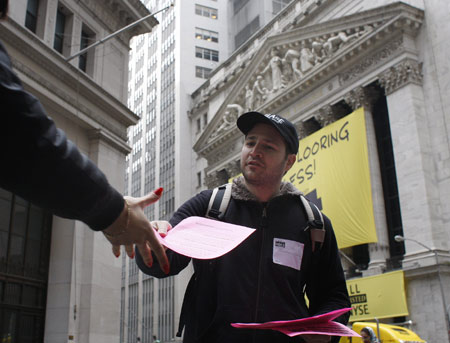
Freelance writer Jonathan Kesselman passes out flyers in
front of the New York Stock Exchange as the Writers Guild of America strikes for
better wages, in New York, November 13, 2007. - Xinhua/Reuters
TV stars joined Hollywood writers on the picket lines yesterday as the strike
by the writers enters its eighth day, the Writers Guild of America (WGA) said.
Dubbed "Picketing with the Stars," some 100 actors from about 30 shows
picketed at Universal Studios beginning at noon, according to the WGA.
They include Bill Paxon ("Big Love"), Nicollette Sheridan ("Desperate
Housewives"), Ray Romano ("Everybody Loves Raymond") and George Lopez("George
Lopez Show").
The WGA is on strike in a dispute over future revenue from shows distributed
over the Internet and other new media.
The strike started last Monday after the WGA contract expired and
negotiations stalled. No new talks are scheduled.
The Alliance of Motion Picture and Television Producers (AMPTP) on Monday
took out ads in Daily Variety and the Hollywood Reporter headlined "Setting the
Record Straight..."
The ads asserted that the WGA knows, and its own records prove, that writers
are already paid residuals on permanent digital downloads and pay-per-view
digital downloads, and that "this additional compensation was part of more than
260 million dollars in record-breaking residuals paid to WGAW members in 2006.
The ad went on to state that, "when the WGA went on strike, an offer to pay
writers for Internet streaming was on the table."
The WGA responded with a statement claiming the producers are trying to roll
back benefits to writers regarding new media.
"The AMPTP told us in negotiations that new media was going to cannibalize
traditional media," Neal Sacharow, WGA West director of communications, said in
the statement. "Therefore, writers need a fair residual formula just to keep up.
The proposals the companies brought to the table would decimate writers'
incomes."
Daily TV talk shows have been hit hard by the strike, and many other programs
have also stopped production without writers to provide dialogue. Gov. Arnold
Schwarzenegger has urged both sides to settle their differences quickly. He said
the strike was already having a major impact on the state's economy.
A WGA strike in 1988 was the last to cause a major disruption in the
entertainment industry. It lasted 22 weeks and cost the industry an estimated
500 million dollars.
The WGA claims about 12,000 members, about 4,000 of whom are in New York.



